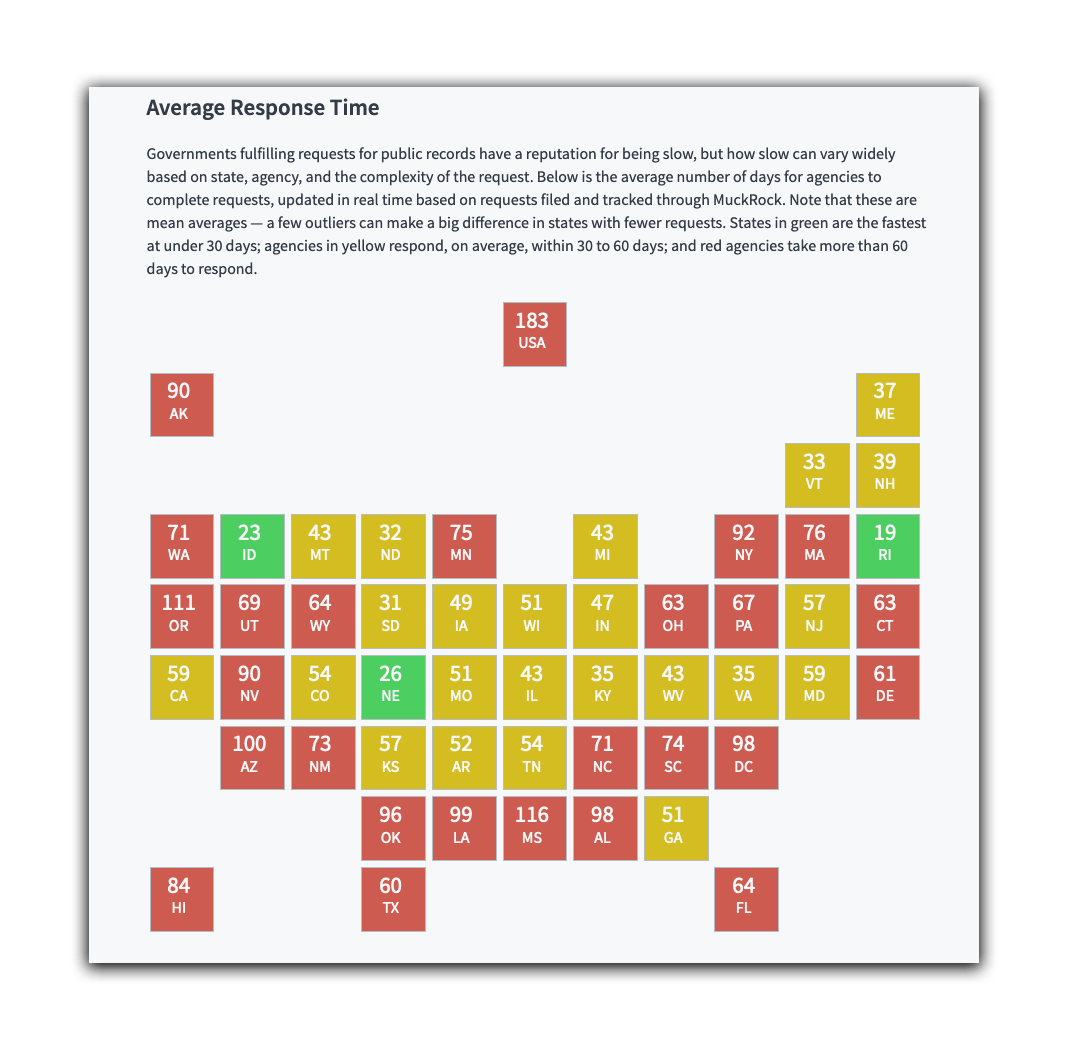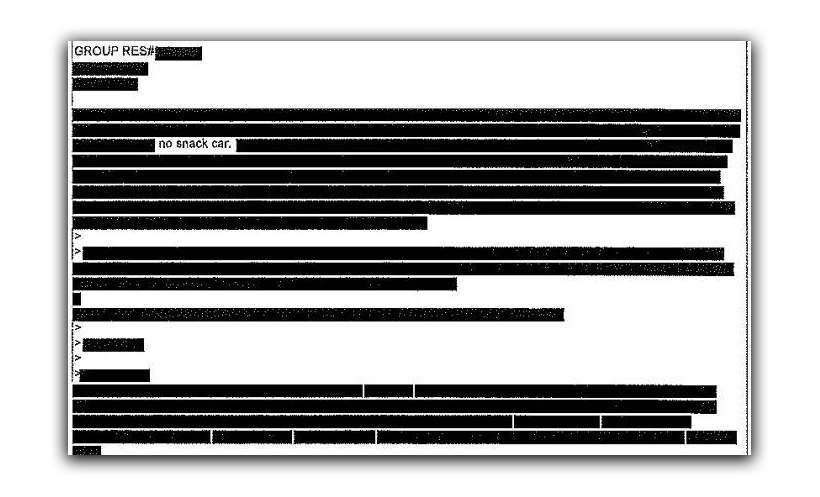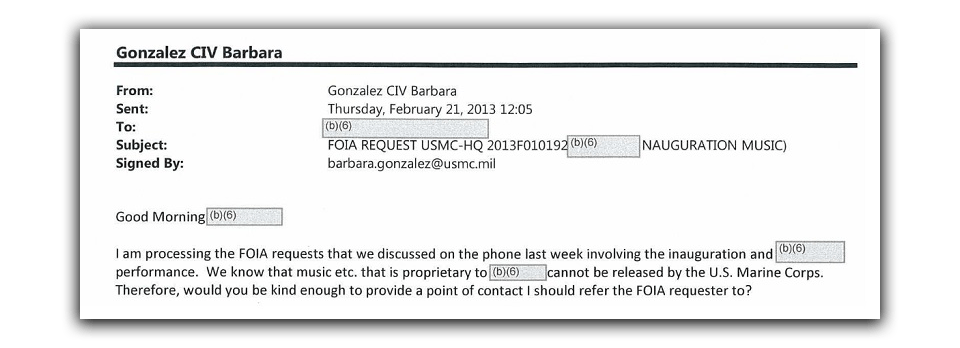Public Records Act or FOIA Requests
FOIA & Databases
Freedom of Information Act
FOIA stands for the Freedom of Information Act, a national law (5 U.S.C. § 552) that requires federal agencies to make available information to the public with some exceptions.FOIA is now used as a colloquialism in the United States as any type of request for information from any government agency. However, it is important to note that officially, FOIA law pertains only to federal agencies. State and local agencies have their own FOIA rules.FOIA or Public Records Act (PRA) requests come in three forms:
- Federal level, 5 U.S.C. § 552. The First Amendment gives rights of access, motions to unseal records, etc.
- State level, in California the law is Cal. Gov. Code § 6250 et seq., and is different from state to state.
- Local ordinances, like San Francisco Admin. Code § 67 (Sunshine Ordinance).
“The basic purpose of FOIA is to ensure an informed citizenry, vital to the functioning of a democratic society, needed to check against corruption and to hold the governors accountable to the governed.”
N.L.R.B. v. Robbins Tire & Rubber Co., 437 U.S. 214, 242 (1978)
The website MuckRock provides information about FOIA laws for each state.
National FOIA
Agencies
“Each authority of the Government of the United States, whether or not it is within or subject to review by another agency” 5 U.S.C. § 551(1)While FOIA covers most agencies, there are some exceptions:Includes:
- Executive and military departments
- Government corporations (i.e. Amtrak) or Government-controlled corporations
- Independent regulatory agencies 5 U.S.C. § 552(f)(1)
- Congress
- Courts
- Territories or possessions of the United States (e.g. Puerto Rico)
- Government of the District of Columbia
- Some parts of the Executive Office of the President
- Courts martial and military commissions
What Records Fall Under FOIA?
The allowable definition is ambiguous, “Any info . . . maintained by an agency in any format, including an electronic format.”
However, there are exceptions:
THE BIG NINE: Exemptions
- b(1) National security information
- b(2) Internal personnel rules and practices
- b(3) Information exempt under other laws
- b(4) Confidential business information
- b(5) Privileged inter- or intra-agency communications
- b(6) Personal privacy
- b(7) Law enforcement records
- b(8) Financial institutions
- b(9) Geological information
Timeline for Determination
The government is required to respond by 20 working days. Agency can have up to 10 more working days, if it invokes and explains “unusual circumstances” are present (which it often does).
Potential Responses

Via MuckRock’s FOIA redaction of shame
Potential responses to your FOIA request:
- Silence
- “Glomar” response (We cannot confirm or deny existence of those records)
- Denial of Request (often occurs)
- Records-Related Responses
- Documents released in full
- Documents released in part
- Documents withheld in full
- Agency found no documents responsive to your request
If redacted, each redaction needs to include information as to the legal exception it is citing to justify those redactions. This can be challenged in court if needed.

In the above example, a FOIA request was made by the Times of London for a performance pop singer Beyonce had given during the second inauguration of former president Obama. The Times was trying to find out if she had lip synced. In the reply, the Navy (who organized the event) decided Beyonce’s name was to be redacted for personal privacy reasons.
The ‘Always Appeal Denials’ Philosophy
Most FOIA experts will encourage journalists to always appeal denials. This keeps the request in the system and creates opportunities for potentially releasing records in the future.The determination letter (rejection) will inform you of your right to appeal.Note: You must file an administrative appeal in time specified if you want relief.Your appeal should include:
- Statement that it’s an appeal and statutory reference (5. U.S.C. § 552(a) (6))
- The request reference number
- Background on denial (can include denial letter as an attachment)
- Argument in support of appeal
- Any additional materials
- Your contact information
You can also resort to litigation. If you exhausted administrative remedies, can sue to enforce request / challenge agency withholdingsNote: Litigation can be expensive and time consuming.
- Usually quicker than most federal cases
- $400 filing fee in federal court
- Cases concluded by settlement or summary judgment (no trials)
- Attorney’s fees may be recoverable
FOIA Strategies
Here are the basic parts of a FOIA request:
1. Statement of Request
- Clearly indicate you are making a request pursuant to the Freedom of Information Act (invoke statute by name)
- Describe Records Sought
- Be clear and specific about what you want • Make sure request is reasonable
- Include date range
- Ask for particular format of records
Requesters must ask for existing records. Requests may have to be carefully written in order to obtain the desired information. Sometimes, an agency will help a requester identify a specific document that contains the information being sought. Other times, a requester may need to be creative when writing a FOIA request in order to identify an existing document or set of documents containing the desired
information.
There is a second general limitation on FOIA requests. The law requires that each request must reasonably describe the records being sought. This means that a request must be specific enough to permit a professional employee of the agency who is familiar with the subject matter to locate the record in a reasonable period of time.
2. Fee Status / Waiver
- Explicitly indicate status as a “representative of the news media” pursuant to 5 U.S.C. § 552(a)(4)(A)(ii)
- You must be willing to pay for duplication costs ~$0.10–$0.35/page, but you can set a cap. Do not pay search costs.
- Public Interest Fee Waivers / Fee Reductions (Good if you’re a student doing research)
- Explicitly indicate you’re seeking a public interest fee waiver pursuant to 5 U.S.C. § 552(a)(4)(A)(iii)
- Describe scholarly, historical, or current public interest served by request
- Describe significance of contribution to public understanding
3. Request for Expedited Processing
- 5 U.S.C. § 552(a)(6)(E) permits requests for expedited processing if requester establishes a “compelling need”
- Compelling need includes:
- Failure to obtain requested records on an expedited basis “could reasonably be expected to pose an imminent threat to the life or physical safety of an individual”
- If request is made by a ”person primarily engaged in disseminating information” there is “urgency to inform the public concerning actual or alleged Federal Government activity”
- Must certify that statements about alleged activity / public concern are true
Verify your commitment to Pay Fees Contact Information
FOIA Template
This is a rough starting template for FOIA document. Note: This is not a sure-fire FOIA template. You should customize your letter to include all of the necessary components.Agency Head [or Freedom of Information Act Officer]
Address of Agency
City, State, Zip Code
Re: Freedom of Information Act RequestDear ______________:This is a request under the Freedom of Information Act pursuant to 5 U.S.C. § 552.I request that a copy of the following documents [or documents containing the following information] be provided to me: [identify the documents or information as specifically as possible].• Be clear and specific about what you want
• Make sure request is reasonable
• Include date range
• Ask for particular format of recordsIn order to help to determine my status to assess fees, you should know that I am a representative of the news media affiliated with the ___________ (newspaper, magazine, television station, etc.) 5 U.S.C. § 552(a)(4)(A)(ii) and this request is made as part of news gathering and not for a commercial use.ORI’m affiliated with an educational or noncommercial scientific institution, and this request is made for a scholarly or scientific purpose and not for a commercial use.ORI’m an individual seeking information for personal use and not for a commercial use.ORI’m affiliated with a private corporation and am seeking information for use in the company’s business.I am willing to pay fees for this request up to a maximum of $_____. If you estimate that the fees will exceed this limit, please inform me first.5 U.S.C. § 552(a)(6)(E) permits requests for expedited processing if established as a compelling need.Complying with this request in an expedited manner “could reasonably be expected to pose an imminent threat to the life or physical safety of an individual”ORI am a “person primarily engaged in disseminating information” and there is “urgency to inform the public concerning actual or alleged Federal Government activity”I certify that statements about alleged activity / public concern are true.
Here are some resources related to public records.
General FOIA resources
- Official U.S. Government FOIA portal
- FOIA Mapper for finding contact information, and status of FOIA requests to the same agency
- MuckRock Public Records Request Site, has templates and see examples of other FOIA reports
- Reporters Committee for Freedom of the Press
- FOIA Wiki
- National Security Archive at George Washington University of 30 years of FOIA releases
- Department of Justice FOIA guide
- Open records & meetings guide
- The First Amendment Project in Oakland, CA, has a Freedom of Information Act guide
- State FOI resources from NFOIC.org
- Reporter’s Committee Freedom of the Press Open Government Guide
About this Tutorial
This tutorial was originally written by Paul Grabowicz for students in his Computer Assisted Reporting class at the UC Berkeley Graduate School of Journalism. It was re-written by Jeremy Rue.
Republishing Policy
This content may not be republished in print or digital form without express written permission from Berkeley Advanced Media Institute. Please see our Content Redistribution Policy.
